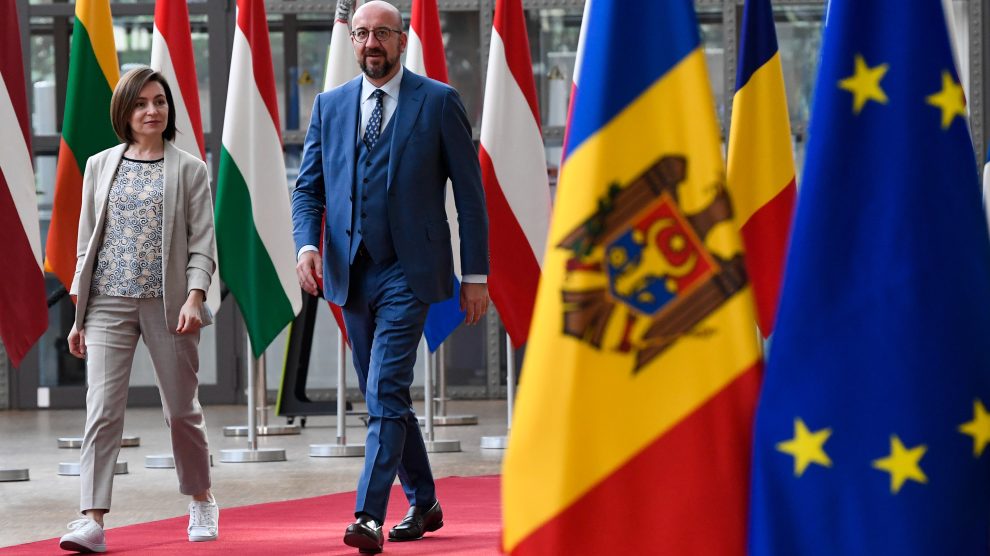Moldova is turning away from Russia, decisively so, and voters appear ready to back the shift.
A new poll in Moldova by the International Republican Institute’s (IRI) Center for Insights in Survey Research (CISR) shows strong support for European Union (EU) membership, optimism in the country’s direction, and rising approval ratings for President Maia Sandu.
The poll found that Moldovan support for joining the EU remains at 63 per cent. This is unchanged from a previous IRI poll conducted in November 2022.
- For Moldova, EPC summit is a chance to shine
- It’s not just Ukraine. Russia occupies territory in other countries in emerging Europe
- Is enlargement back on the EU agenda?
“Our polling continues to demonstrate that Moldovans want to further associate with the West,” said Stephen Nix, Senior Director for Eurasia at IRI. “Membership in the EU will undoubtably help bring peace and prosperity to Moldova.”
The survey found that 42 per cent of adults believe Moldova is moving in the right direction. This represents a 14-point increase from IRI’s previous poll and the highest it has been in nearly a decade.
President Sandu’s approval rating is also on the rise, increasing by six percentage points in the last poll to 46 per cent today.
“Citizens in Moldova, including the youth, are growing increasingly confident in the Sandu government’s ability to manage the economic, military, and energy issues that have arisen in recent years,” said Nix.
A significant step
The poll will come as welcome news for Sandu, who has maneuvered Moldova carefully westwards since being elected in 2020. The country formally applied for EU membership in February 2022, immediately after Russia’s invasion of Ukraine, and was awarded candidate status in June 2022.
Sharing a long border with Ukraine, Moldova has over the past 18 months become a frontline state of great interest to anyone following events in Central and Eastern Europe. At the beginning of the war there were even concerns that Russia might use its military base in Transnistria, a breakaway region of Moldova, to launch attacks on southern Ukraine.
Earlier this summer it successfully hosted the second meeting of the European Political Community (EPC), an informal body created last year following a plea from French President Emmanuel Macron calling for a new political organisation to unite democracies—both inside and outside of the EU—on the European continent.
The EPC summit was preceded by a rally in support of European Union membership, attended by tens of thousands of people.
“Moldovans know how to make the right choice because there is no family that does not have brothers or grandchildren in Europe,” Sandu told the crowd, a sea of EU, Ukrainian, and Moldovan flags. “We know that peace and prosperity are in Europe. Moldova will join the European Union, and this must happen by 2030.”
On September 8, Moldova signed an agreement with the EU that will see it participate in the bloc’s Single Market Programme (SMP), designed to prepare the private and public sector of candidate countries for the rules and regulations of the EU’s Single Market.
The SMP supports and promotes a culture of innovation through the development of industrial ecosystems able to encourage the creation of start-ups and the development of existing SMEs, especially through the promotion of new business models, including within European partnerships between clusters and business organisations.
Sandu called the agreement a “significant step”, which she said, “paves the way for our businesses and state institutions to align with EU standards.”
“The agreement is yet another milestone in our EU journey, connecting us to the world’s largest single market,” she added.
Turning away from Russia
While full EU membership might take another decade, at least, joining the EU’s SMP should be viewed as another clear signal that Moldova has definitively turned away from Russia.
Moldova has taken the opportunity offered by an influx of support from Western allies to uncouple itself from Russia, both politically and economically. It has also quietly increased engagement with NATO, despite its constitutional neutrality. Foreign Minister Nicu Popescu attended NATO’s recent summit in Vilnius.
These efforts to uncouple from Russia took on new importance in February when Sandu—who has suggested that the issue of Moldova’s neutrality could be reviewed—accused Russia of plotting to use foreign “saboteurs” to overthrow her pro-EU government.
In March, a secret Russian plan to destabilise Moldova—including supporting pro-Russian groups, utilising the Orthodox church and threatening to cut off supplies of natural gas—was obtained by various international press organisations appearing to confirm Sandu’s claims.
Sandu has since the start of Russia’s war in Ukraine been a constant presence at international forums, warning continually that Russia poses a threat not just to Ukraine but to all of the countries of the region.
“Russia wants to remake the Soviet Union,” she said in May in an interview with the Financial Times.
Later that month, Prime Minister Dorin Recean confirmed that the country had fully weaned itself off Russian gas, saying that while at the start of the war 100 per cent of the energy consumed in Moldova originated in Russia, “today Moldova can exist with absolutely no natural gas or electricity from Russia”.
In June, Moldova banned the pro-Russian Șor party, founded by Ilan Șor, a controversial businessman convicted of fraud and currently living in exile in Israel, after the country’s constitutional court ruled that a wave of anti-government protests led by the party were “unconstitutional”.
Photo: Maia Sandu with Charles Michel, president of the European Council. © European Union.
Unlike many news and information platforms, Emerging Europe is free to read, and always will be. There is no paywall here. We are independent, not affiliated with nor representing any political party or business organisation. We want the very best for emerging Europe, nothing more, nothing less. Your support will help us continue to spread the word about this amazing region.
You can contribute here. Thank you.


